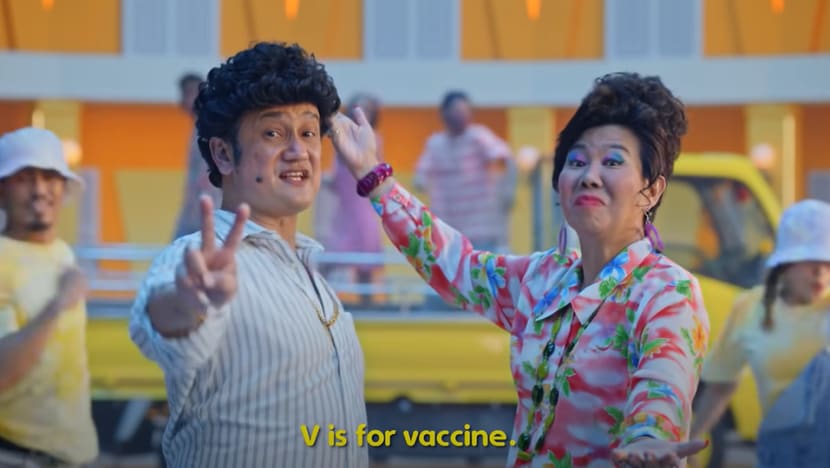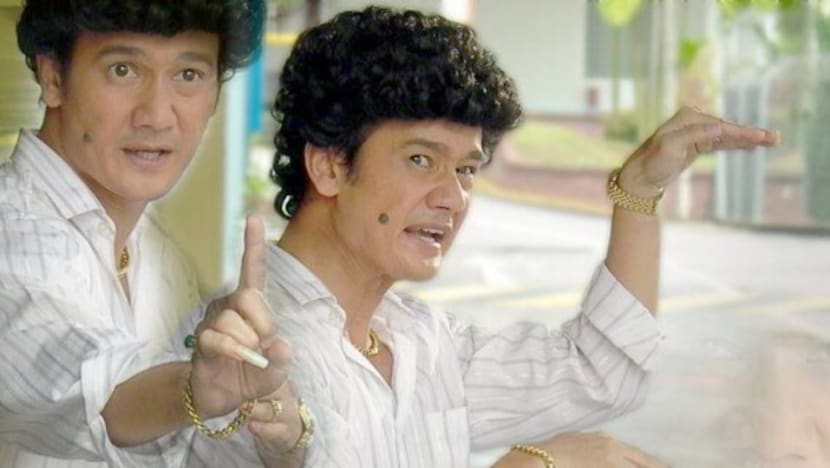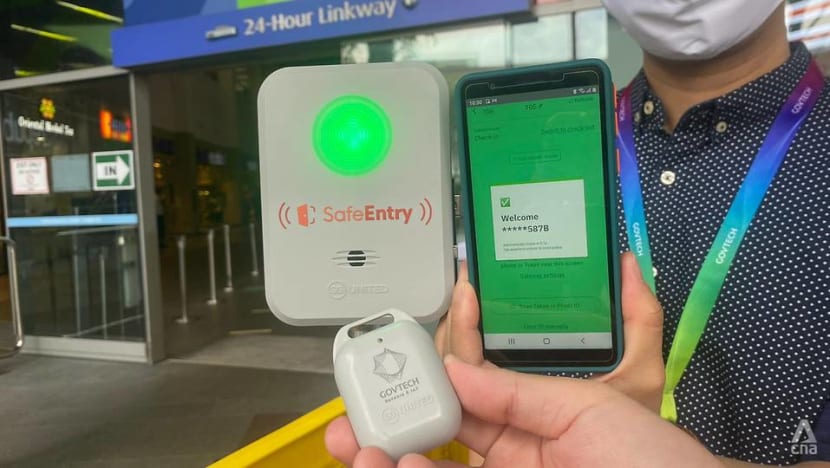commentary Commentary
Commentary: Does Singapore have to resort to 'slapstick and Singlish' to get public messages across?
Whether you found it tacky or catchy (or both), the Phua Chu Kang-fronted COVID-19 vaccination music video sure got everyone’s attention. Isn’t that half the battle won, asks Tracy Lee.

Screenshot of the "Get Your Shot, Steady Pom Pi Pi" music video.
SINGAPORE: By now, you’ve probably seen Get Your Shot, Steady Pom Pi Pi, the colourful, raucous Singlish-inflected rap music video.
The video features local 1990s sitcom character Phua Chu Kang (PCK) exhorting all the doubters and stragglers among us to “Faster go and vaccinate” against COVID-19, with his characteristic cheesy lyrics and dance moves.
Less than a week after its May 2 release, the video has attracted hundreds of thousands of views. People were divided on its effectiveness and appropriateness.
Comments ranged from the mean (“I should have gotten my vaccine before watching this video - because this is viral”) to the downright evil (“If ever there was a prize for being a village idiot, this guy takes it to a whole new level!!!”) and the snobbish (“I guess the Government’s given up on the Speak Good English campaign”).
READ: Commentary: Concerns over long-term side effects could hold back Singapore’s COVID-19 vaccination programme
PCK however found traction with his supporter base (“This put a smile on my face. PCK is so classic”), some of whom wanted even more (“If I vaccinate, will we get a season 9 of PCK?”) and were not afraid to use all-caps to show their love (“SO CRINGE THAT I LOVE IT”).
Speaker of Parliament Tan Chuan-Jin even cheekily tweeted: “Get vaccinated! Otherwise we will have to keep playing this video ad nauseum”.
This time PCK outdid even himself. He was not only best in Singapore, JB (Johor Bahru), and some say, Batam – as his character famously used to say in each episode of the sitcom’s heydays – he made international headlines.
The foreign press took note of the viral video. British daily The Guardian favourably described the song as giving “surprisingly detailed medical advice” in the form of “informative disco”.
SO EMBARRASSING
I have to admit, I groaned when I first set eyes on it, then quickly forwarded the clip to my friends with the comment “so embarrassing!”

Don’t get me wrong.
I’ve absolutely adored Gurmit Singh as Phua Chu Kang (and Irene Ang as Rosie) ever since the sitcom about a loveably eccentric ah beng contractor and his garrulous family came into our lives in 1997.
That PCK won Best Comedy Programme at the Asian Television Awards for six consecutive years (from 1998 to 2003), that it enjoyed an eight-season run over 10 years, and that its extremely talented lead character still commands instant recognition 24 years on, just go to show what an enduring pop culture icon and national treasure PCK has become.
Yet I couldn’t help feeling I was getting a little tired of the fact that every time a public service message needs announcing, PCK is tapped on to deliver it with buckets full of Singlish kitsch.
READ: Commentary: Why many under 45 are hoping vaccination slots open in June
READ: Commentary: Why Singapore’s travel restrictions will keep changing for a while more
To his credit, he does that incredibly well. But is there no other way to hammer home an important public message?
After all, PCK had already done a rap for the 2003 SARS epidemic. Since the COVID-19 pandemic struck in 2020, he has also already appeared in a techno-style music video called Singapore Be Steady, and another video where he speaks about how Singaporeans can protect themselves from COVID-19.
Singapore has no shortage of accolades in dealing with the coronavirus, such as when Bloomberg ranked us the best place in the world to be during the pandemic.
We seem to be a pretty modern, sophisticated country that can get its act together and run a tight ship in the face of a persistent virus wreaking havoc across the world.
But these days, thanks to the Internet and social media, any public message crafted for local consumption can be shared with or accessed by anyone, anywhere.

Can we afford to have the rest of the world think Singaporeans have a mental age of five-year-olds, when we’re supposed to be a global centre for innovative technology, with future-ready and world-class talent?
And should we accept that cringe-worthy public communications will always be standard fare for public service announcements and government messaging?
BUT IT GETS THE JOB DONE
For now, looking at the global scale of the health crisis and its attendant risks, perhaps the practical answer might be: Whatever works to get the job done.
Perhaps bare facts are just too boring — who even remembers those sterile mask-wearing or safe distancing campaigns?
Moreover, according to Fortune, such serious public health advertising may be counter-effective “because it incites people’s worst fears rather than provide clear steps viewers can take to save lives”.
Besides, sometimes celebrities are the most effective way to drum home that message.
READ: Commentary: COVID-19 unlikely to become a thing of the past anytime soon
“For some people, having celebrities who are familiar, seeing their faces, hearing them speaking up and saying they are taking the vaccine, or they can vouch for the safety of it, will be convincing,” Dr Lisa Cooper, director of John Hopkins Centre for Health Equity told CNBC recently.
This has held true for decades outside Singapore. After a photo of Elvis Presley getting vaccinated against polio backstage at The Ed Sullivan Show was splashed all over American papers in the 1950s, the polio vaccination rate among youth went from a measly 0.6 per cent to 60 per cent in six months.
So then what better way than to use the PCK character - with song, dance, humour and in a way that can be understood by Singaporeans of all ages. Heck, it was even done in rhyming verses.
READ: Commentary: Dear public service, what do you mean by this jargon?
Public health campaigns are not easy to design. They need to influence public knowledge, attitudes and behaviours, urgently so and with high stakes in the case of COVID-19.
They can have patchy results. Sometimes, there isn’t a clear or direct relationship between the messages sent to people and the reactions these people have to the messages.
In addition to interpreting messages in very unique ways, experts have also pointed out how people respond differently to messages received, and therefore, the campaign planner must take many different communication variables into account.
Is this message clear and compelling for the intended audience? Will the audience pay attention to it? Will they adjust their behaviours in response?
Hence, an effective communication campaign must use carefully designed messages that not only match the interests and abilities of the audience, but also channels the target audience trusts and can easily access.
As such, considerations of wide appeal, expediency and other lowest common denominators are more likely to hold sway than refinement or wit.
(Are COVID-19 vaccines still effective against new variants? And could these increase the risk of reinfection? Experts explain why COVID-19 could become a “chronic problem" on CNA's Heart of the Matter podcast.)
RAISE OUR BAR FOR PUBLIC CAMPAIGNS
PCK’s latest video has certainly got our attention, we’ve talked about it endlessly over this week, and if you still haven’t seen it, you can on YouTube.
Perhaps the Singapore Government is wise to stick with Uncle Phua for now. Our leaders are better off fussing over pressing matters in tackling this latest coronavirus wave in Singapore, and worrying how we are going to cope with fewer construction workers and domestic workers.
Like him or hate him, you cannot deny PCK is the most recognisable, relatable national personality. He resonates with most of us.
That is probably why every time the Singapore Government needs to send an urgent and serious message – be it SARS and COVID-19 - PCK is called upon.
READ: Commentary: How to stay sane in a time of COVID-19 information overload
READ: Commentary: What to do with all these health rumours and forwarded messages in the time of COVID-19?
Perhaps the bigger question is why we haven’t seen another national television icon rise after 24 years.
Still, I would challenge government communicators to do better for the next public education campaign that doesn’t insult our intelligence, nor make us look like a parochial backwater to outsiders.
In the meantime, all the young kids in Singapore who’ve heard the song have probably memorised it and are incessantly singing its catchy and rhyming lyrics at home.
That could prove the most effective way to remind parents and grandparents that the vaccination is “safe for most including elderly, because the government got check properly”.
Tracy Lee is a freelance writer who writes about food, travel, fashion and beauty.














